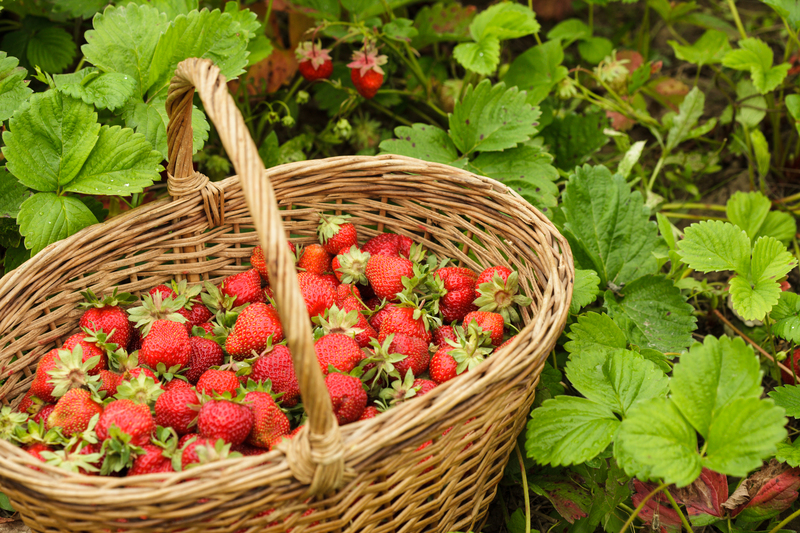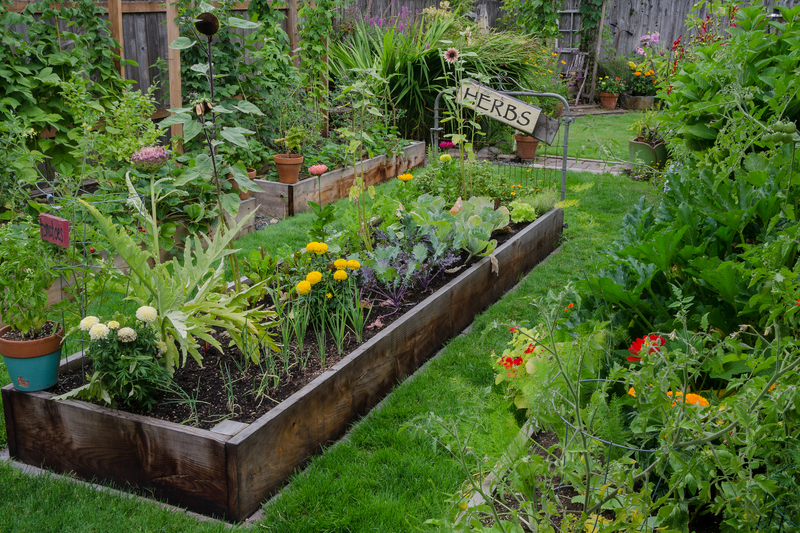Eco-friendly Soil Enrichment from Waste
Posted on 11/09/2025

Eco-friendly Soil Enrichment from Waste: Sustainable Solutions for Healthy Soil
In today's world, eco-friendly soil enrichment from waste has emerged as a game-changer for both urban and rural agriculture. By transforming organic, agricultural, and even some industrial waste into sustainable soil amendments, this practice not only diverts waste from landfills but also rejuvenates the earth, supports robust plant growth, and fosters a healthier environment.
This comprehensive guide explores the best methods, benefits, and practical steps for using waste to enrich soil sustainably. Whether you are a home gardener or a commercial farmer, read on to learn how you can turn waste into a green gold for your soil.
- Why Eco-friendly Soil Enrichment from Waste Matters
- Types of Waste Used for Sustainable Soil Enrichment
- Techniques for Turning Waste into Soil Enrichers
- Key Benefits of Waste-based Soil Enhancement
- DIY Tips and Best Practices for Eco-friendly Soil Treatment
- Challenges and How to Overcome Them
- The Future of Eco-friendly Soil Enrichment from Waste
Why Eco-friendly Soil Enrichment from Waste Matters
Soil health forms the foundation of sustainable agriculture and thriving ecosystems. Over the decades, intensive farming, excessive use of chemicals, and growing urbanization have led to a rapid degradation of soil quality.
Eco-friendly soil enrichment from waste addresses these issues on multiple levels:
- Reduces landfill burden by recycling organic waste into useful amendments
- Restores nutrient cycles, ensuring plants get balanced and natural nutrition
- Promotes holistic sustainability by closing the loop between waste generation and food production
- Decreases pollution and greenhouse gas emissions from decomposing landfill waste
The Global Waste Challenge
According to the World Bank, the world generates over 2 billion tonnes of municipal solid waste annually, and at least one-third is not managed properly. A large proportion of this waste is organic and can be repurposed to improve our soils and food systems.
Regenerating Soil Health with Sustainable Practices
Soil enrichment using waste promotes a closed-loop cycle: what comes from the earth returns to it, reducing dependency on synthetic fertilizers and harmful chemicals.
Types of Waste Used for Sustainable Soil Enrichment
Not all waste is suitable for direct application, but with the right processing, a variety of waste streams can become valuable soil amendments. Below are the most common types:
- Organic Household Waste: Food scraps, vegetable peels, fruit rinds, coffee grounds, eggshells
- Yard and Garden Waste: Leaves, grass clippings, small branches, plant trimmings
- Agricultural Waste: Crop residues, husks, animal manure, straw, chaff
- Agro-industrial Byproducts: Brewery waste, sugarcane bagasse, nut shells, fruit pulp
- Biodegradable Packaging: Paper products, unbleached cardboard, compostable plastics (with care)
- Other Compostable Materials: Wood shavings, sawdust (from untreated timber), natural fibers
What to Avoid?
- Meat, dairy, and oily foods -- attract pests and slow decomposition
- Synthetic chemicals and plastics -- do not decompose and can be harmful to soil life
- Treated wood, glossy paper, and toxic substances -- release dangerous contaminants
Techniques for Turning Waste into Soil Enrichers
There are several proven methods to convert different types of waste into valuable eco-friendly soil enrichers. Each method creates unique byproducts suited to specific agricultural or gardening needs. Here's an overview of the top methods:
1. Traditional Composting
- Aerobic composting uses bacteria, oxygen, and heat to break down organic waste into rich humus.
- Involves careful balancing of green (nitrogen-rich) and brown (carbon-rich) materials.
- Takes anywhere from 2 to 12 months, depending on method and conditions.
Benefits: Easy to do at home or farm, improves soil structure, boosts water retention and nutrient content.
2. Vermicomposting
- Uses worms (typically Eisenia fetida or red wigglers) to digest organic waste.
- Produces worm castings, an incredibly potent and microbially active soil conditioner.
- Excellent for small spaces, urban gardens, and even balconies.
3. Bokashi Fermentation
- An anaerobic method, where Effective Microorganisms (EM) ferment all types of kitchen scraps, including meat and dairy.
- Very quick (2-3 weeks), minimal odor, and highly efficient for food waste.
- Bokashi pre-compost is then buried or composted further before plant use.
Advantages: Can process more types of waste, minimal space required, and rapid results.
4. Biochar Preparation
- Organic waste (like wood chips, husks, and pruning) is heated in a low-oxygen environment (pyrolysis) to yield a porous mineral called biochar.
- Biochar is mixed into soil where it improves structure, increases water-holding capacity, and sequesters carbon long-term.
Bonus: Biochar can be "charged" with compost, manure, or worm tea for greater soil impact.
5. Green Manuring and Mulching
- Some organic waste is best used directly as mulch, protecting soil from erosion and feeding soil life as it decomposes.
- Cover cropping (green manure) with fast-growing plants, then plowing them under to enrich the soil.
6. Industrial-Scale Anaerobic Digestion
- On large scales, food, animal, and crop wastes are broken down in biogas plants to yield nutrient-rich digestate suitable as fertilizer.
- Also generates renewable biogas for energy!
7. Liquid Fertilizers from Waste
- Compost teas, worm teas, and liquid extracts are made by steeping compost or vermicompost in water.
- Provides quick-acting nutrients and soil microbes when used as a foliar spray or root drench.
Key Benefits of Using Waste to Enrich Soil
- Boosts Soil Fertility - Supplies essential macro and micronutrients for plants.
- Improves Soil Structure - Enhances aeration, water infiltration, and root development.
- Increases Biodiversity - Encourages earthworms, beneficial microbes, and insects.
- Reduces Erosion and Compaction - Mulches and organic matter protect topsoil.
- Decreases Reliance on Chemicals - Naturally restores fertility, reducing synthetic fertilizer and pesticide use.
- Combats Climate Change - Sequesters carbon, reduces landfill methane, and helps create carbon sinks.
- Cost-effective and Accessible - Cuts waste disposal costs and provides free or low-cost soil amendments.
- Builds Resilient Crops - Healthier soil supports stronger, drought- and disease-resistant plants.
DIY Tips and Best Practices for Eco-friendly Soil Treatment
Ready to enrich your soil the green way? Here are some time-tested tips to get started:
Composting at Home
- Choose a well-ventilated compost bin, tumbler, or open pile in a shady spot.
- Layer equal parts greens (food scraps, grass) and browns (leaves, paper, woody material).
- Keep the pile moist but not soggy; turn it every 2-4 weeks to aerate.
- Compost is ready when it is dark, crumbly, and earthy smelling--typically in 3-6 months.
Making Vermicompost
- Get a worm bin and stock with red wigglers (Eisenia fetida).
- Add bedding (shredded newspaper, coconut coir) and kitchen scraps.
- Harvest worm castings in 2-4 months as a top-dressing or soil mix.
Bokashi for Urban Spaces
- Layer food waste in an airtight bucket with bokashi bran.
- Press down waste to minimize air pockets; drain any liquid ("bokashi tea") and dilute for use as a fertilizer.
- Bury fermented material in garden soil or add to compost for final breakdown.
Using Leaves and Grass for Mulch
- Shred leaves for faster decomposition and weed control.
- Apply in 2-4 inch layers beneath plants to retain moisture and feed soil life.
- Never pile grass clippings too thickly; they may become anaerobic and smelly!
Safe Waste Collection and Use
- Keep compostable materials separated from non-compostable waste at the source.
- Avoid adding diseased plants, toxic chemicals, or large amounts of citrus/onion (which harm soil microbes).
- If using manure, ensure it is well-aged to avoid burning plants or introducing pathogens.
Challenges and How to Overcome Them
While eco-friendly soil enrichment from waste has tremendous benefits, some barriers exist:
- Odor and Pest Management: Choose appropriate waste types, manage moisture, and aerate compost regularly to avoid smells and critters.
- Space Limitations: Use compact methods like vermicomposting or bokashi in small spaces (apartments, balconies).
- Knowledge Gaps: Access local workshops or online resources to learn correct ratios, composting timelines, and troubleshooting.
- Contaminant Risks: Always avoid treated wood, plastics, and chemical residues; stick to natural organic materials.
- Community Involvement: Organize neighborhood composting or collection initiatives to scale up impact and reduce workload.
The Future of Eco-friendly Soil Enrichment from Waste
As environmental concerns and waste generation escalate, the need for sustainable soil management grows more urgent. Innovative startups, municipal programs, and even policy changes are making it easier for communities to transform waste into a valuable resource rather than a problem.
The trend towards regenerative agriculture and circular economies positions soil enrichment from waste as a leading solution for:
- Reducing landfill overflow and pollution
- Lowering agricultural costs while boosting yields
- Combatting desertification and promoting biodiversity
- Fostering food security and climate resilience
The future lies in education, innovation, and collaboration. By choosing to recycle organic waste into soil--at home, at the farm, or within our cities--we make a positive impact on the planet, one handful of soil at a time.

Conclusion: Join the Eco-friendly Soil Revolution
Eco-friendly soil enrichment from waste is more than a sustainable practice--it's a movement towards healthier earth and more resilient communities. By harnessing the power of organic waste, we return precious nutrients to the land, reduce pollution, and lay the foundation for a regenerative, green future.
Whether you start composting your kitchen scraps, advocate for city-wide organic waste recycling, or encourage neighbors to adopt eco-conscious soil management, every step counts. Join the eco-friendly soil revolution today and help sow the seeds for a cleaner, greener tomorrow.
FAQs on Eco-friendly Soil Enrichment from Waste
- Is composting safe for all gardens?
Yes! When done properly, composting is safe and beneficial for flowers, vegetables, and trees. - Can I compost citrus, onions, or pet waste?
Citrus and onions are best in moderation; avoid pet waste for food crops due to pathogen risks. - How fast does waste turn into usable soil amendment?
Composting can take 2-12 months; vermicomposting 2-4 months; bokashi fermenting just 2-3 weeks before soil integration. - Will composting attract rodents?
Proper management and pest barriers (lids, wire mesh) minimize rodent issues.
Enrich your soil, reduce your waste, and grow a greener planet--one compost pile at a time.
Latest Posts
A Wonderland in Your Backyard: Tips for a Child-friendly Garden
The Science and Art of Hedge Trimming Techniques
Design a Lush Playground in Your Backyard for Little Ones

